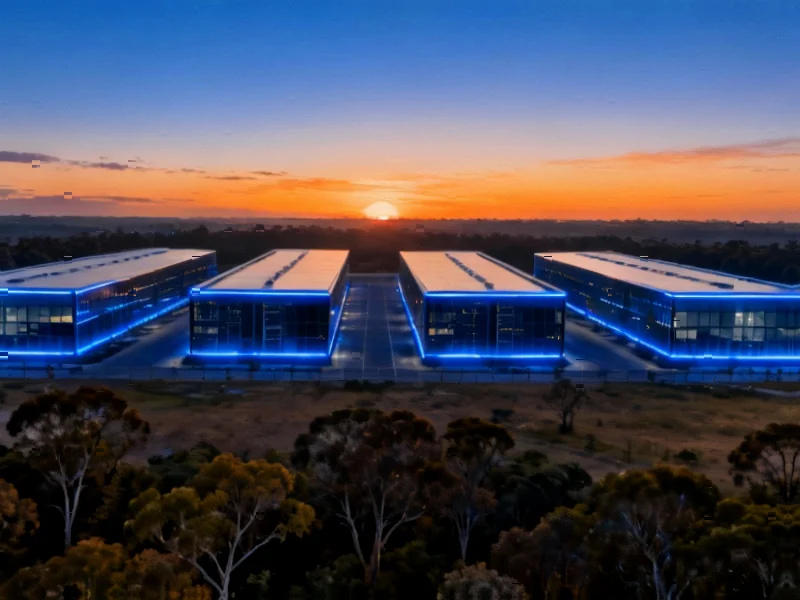According to TechCrunch, a new joint venture called Utopai East is developing specialized AI infrastructure for film and television production through a 50-50 partnership between investment firm Stock Farm Road and AI production company Utopai Studios. The venture brings together Brian Koo, grandson of LG Group founder Koo In-hwoi, and Utopai Studios CEO Ceilica Shen, with the first AI-powered content expected to release next year. The partnership follows SFR’s agreement with Jeollanam-do Province to build a massive 3-gigawatt AI data center in South Korea, which will serve as the foundation for Utopai East’s operations. The joint venture will initially focus on Korean content before expanding to Japan, China, and Thailand, with funding coming from SFR’s investment vehicles, sovereign wealth funds, and entertainment industry partners.
The Infrastructure Challenge in AI Content Creation
What makes Utopai East particularly noteworthy isn’t just the pedigree of its backers but the recognition that AI filmmaking requires specialized infrastructure beyond standard cloud computing. Most discussions about AI in entertainment focus on the creative applications, but the computational demands are staggering. Training and running sophisticated video generation models requires not just processing power but specialized hardware optimized for media workflows. The planned 3-gigawatt data center represents a significant commitment—for context, that’s enough power to support approximately 2-3 million households, indicating the scale of computational resources required for next-generation content creation. This infrastructure-first approach suggests the partners understand that successful AI filmmaking requires solving fundamental engineering challenges before creative ones.
Korea’s Strategic Position in AI Entertainment
The focus on Korean intellectual property represents a strategic advantage that goes beyond simple regional preference. South Korea has become a global content powerhouse, with K-dramas and K-pop achieving international success through sophisticated production values and distinctive storytelling styles. By building AI infrastructure specifically tuned to Korean creative workflows, Utopai East could develop specialized models that understand the nuances of Korean narrative structures, visual aesthetics, and character development patterns. This specialization creates a moat that general-purpose AI video tools from Silicon Valley giants cannot easily replicate. The partnership’s plan to expand access to Korean IP for international audiences suggests they’re positioning Korean content as the foundation for a new generation of globally distributed AI-enhanced entertainment.
The Human-AI Collaboration Model
Utopai Studios’ emphasis on working alongside rather than replacing filmmakers reflects lessons learned from recent industry conflicts. The Hollywood writers’ strike demonstrated that creative professionals will resist technologies perceived as threatening their livelihoods. Utopai’s approach appears designed to avoid these pitfalls by positioning AI as an enhancement tool rather than a replacement technology. Their workflow likely involves AI handling repetitive or computationally intensive tasks like background generation, scene pre-visualization, or special effects rendering while preserving human creative control over narrative, performance, and emotional resonance. This division of labor acknowledges that while AI excels at pattern recognition and generation, human creativity remains essential for storytelling that connects emotionally with audiences.
The Licensing and Ethical Framework
Ceilica Shen’s emphasis on fully licensed models and datasets represents a crucial differentiator in an industry grappling with copyright concerns. Many AI video tools have faced scrutiny over training data sources and potential copyright infringement. By building their technology on properly licensed content, Utopai East positions itself as an ethical player that respects creator rights—a significant advantage when seeking partnerships with established studios and talent. This approach also provides legal certainty that could accelerate adoption among risk-averse entertainment companies. The commitment to contractual approval for all training data suggests they’re building a transparent ecosystem where creators understand how their work contributes to AI development and are compensated accordingly.
Broader Industry Implications
The emergence of specialized AI filmmaking infrastructure signals a maturation of the technology beyond experimental tools toward industrial-scale applications. While consumer-facing AI video generators capture headlines, professional production requires reliability, consistency, and integration with existing workflows that consumer tools cannot provide. The partnership’s focus on both established directors and emerging creators suggests they’re building a platform that can scale from independent productions to major studio projects. As Hollywood continues grappling with AI’s impact, the Utopai East model offers a potential path forward that enhances rather than replaces human creativity while addressing the substantial infrastructure requirements that have limited AI’s practical application in high-end production.
The Asian Content Expansion Strategy
The planned expansion from Korea to Japan, China, and Thailand reflects a sophisticated understanding of regional content dynamics. Each market has distinct production styles, audience preferences, and business models that require tailored AI solutions. Japan’s anime industry, China’s streaming platforms, and Thailand’s growing international film presence each present unique opportunities for AI enhancement. By starting with Korean content—where they have natural advantages through local partnerships and cultural understanding—Utopai East can refine their technology before adapting it to neighboring markets. This regional focus contrasts with Western AI companies that often develop one-size-fits-all solutions, potentially giving Asian creators tools better suited to their specific creative traditions and business needs.




